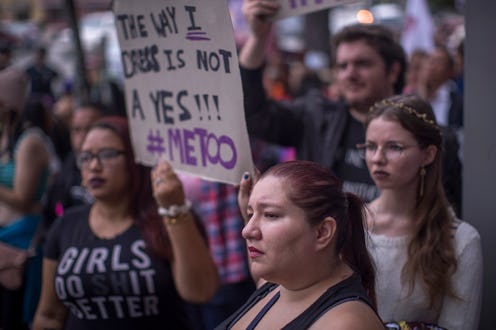News
The "Weinstein Effect" Isn't Just Happening In America — It's Making Waves Worldwide

If you've been following the news lately, you probably already know about the absolute flood of sexual harassment, assault, and misconduct allegations countless women have aired over the past several weeks. Starting off with a series of devastating allegations against Hollywood producer Harvey Weinstein (who has denied all allegations of nonconsensual sexual acts), all sorts of men are now being called out for sexually predatory behavior — in entertainment, music, tech, comedy, politics, and of course, in the day-to-day lives of countless women. But the "Weinstein Effect" isn't just happening in America right now, either ― the ripple effects of the massive scandal and subsequent outcry are being felt in countries around the globe.
Weinstein himself has strenuously denied accusations of rape against him, though in a statement to The New York Times immediately after the first of the stories broke, he acknowledged that he "needed to be a better person."
As far as needing to be a better person goes, it seems like there are a lot of men, both in the United States and abroad, that could use some work on that. In fact, as the Associated Press detailed on Tuesday morning, high-profile alleged sexual harassers and predators are now facing vigorous public outcry across the globe, fueled in part by the dramatic and heartbreaking hashtag #MeToo.
For instance, in Canada, Gilbert Rozon — founder and president of the prominent comedy festival Just For Laughs — has lost his job amid allegations of sexual assault and harassment made by at least nine women, including Quebec entertainment maven Julie Snyder. So far, he has neither confirmed nor denied the accusations — in a statement posted on social media, he apologized to "all those whom I may have offended."
Shaken by the allegations concerning me, I wish to devote all my time to step back and take stock. To all those whom I may have offended throughout my life, I am sincerely sorry.
Although Rozon is reportedly looking to sell off his Just For Laughs shares, the popular comedy festival has been in the news for other reasons in recent weeks, also having to do with sexual misconduct allegations. Just For Laughs alum Louis C.K., for example, recently admitted to longstanding rumors of sexually predatory behavior.
In Italy, prominent director Fausto Brizzi is drawing comparisons to Weinstein, with 10 different women having spoken out against him. Accusations of sexually predatory behavior against Brizzi include supposedly stripping naked, allegedly attempting to make women touch his genitals, and allegedly masturbating in front of them without consent.
Through his lawyer, Brizzi released a statement last week denying the claims — "never in my life have I had non-consensual or forced relations," according to The Local Italy.
In the United Kingdom, 65-year-old former defense secretary Michael Fallon gave up his job amid allegations of sexual misconduct. While Fallon denied some of the claims, he ultimately resigned anyway, telling the media he had "fallen below the high standards" for official representatives of the British military.
Another high-profile case in Britain is that of First Secretary of State Damian Green, a close adviser and confidant of Prime Minister Theresa May. Kate Maltby, a writer and Conservative party advocate, reportedly claimed that Green made inappropriate sexual advances toward her in 2015. Green has denied the allegation, according to The Guardian, calling it "untrue" and "deeply hurtful."
In South Africa, as the AP noted, a former MP named Jennifer Ferguson has gone public with a rape allegation against Danny Jordaan, an anti-apartheid activist who now serves as president of the South African Football Association. Jordaan has denied the allegation, and it's unclear what further action Ferguson might take.
In India, the Weinstein story has spurred scrutiny of the country's own film industry. For example, as Reuters details, actress Divya Unny alleges she was once propositioned for sex at what she'd believed to be a professional meeting about a film role.
You always hear of actresses getting called by directors to hotel rooms at night, but I didn't think twice because I was going in with a reference.
Unny refused, and was not cast in the film. She's now gone public with her story, though she has declined to name the director.
And in Israel, a journalist named Oshrat Kotler publicly accused Alex Gilady, a media magnate and former International Olympic Committee member, of allegedly propositioning her during a job interview 25 years prior. Gilady was subsequently accused of rape by two other women and of indecent exposure by a journalist who met him in 1999. Gilady has denied the rape allegations, according to the AP, and disputed Kotler's story, though he admitted to and apologized for the 1999 allegation of indecent exposure.
In short, the movement that's emerged out of the Weinstein allegations is not restricted by borders or nationality. In fact, the "Me Too" hashtag and its foreign-language offshoots have been used tens of thousands of times in countries around the world.
For example, according to CNN's data on the hashtag, it's been used more than 70,000 times in the U.K. since it began in mid-October. It's similarly been used more than 43,000 times in Canada, more than 20,000 times in Sweden, more than 24,000 times in India, more than 15,000 times in Australia, and more than 1,200 times in Saudi Arabia.
In short, it's a movement that's causing hundreds of thousands of people around the world to speak out about sexual abuse, particularly in a publicly viewable, often anonymous format that empowers them to speak out with less fear of reprisal. And considering just how quickly it's caught fire, it could prove to be a watershed moment.
Correction: An earlier version of this article incorrectly characterized the nature of the accusation against Damien Green.